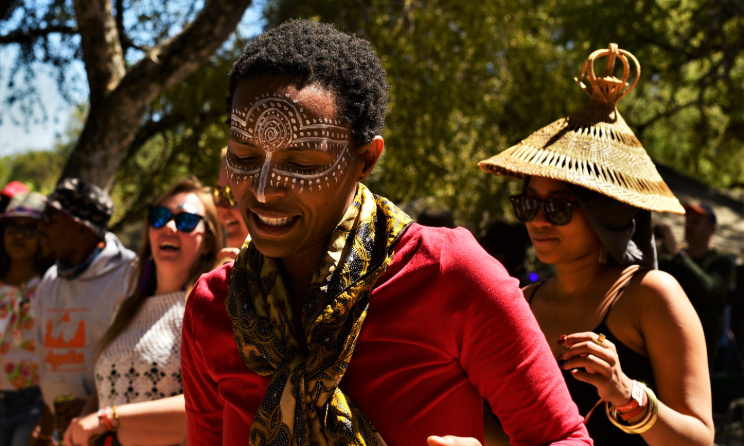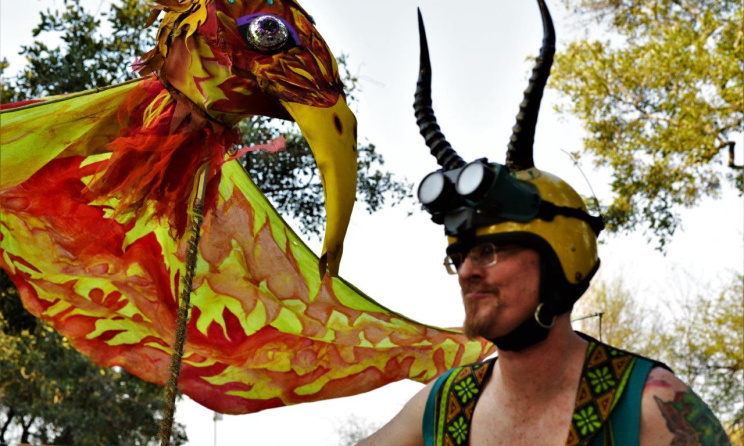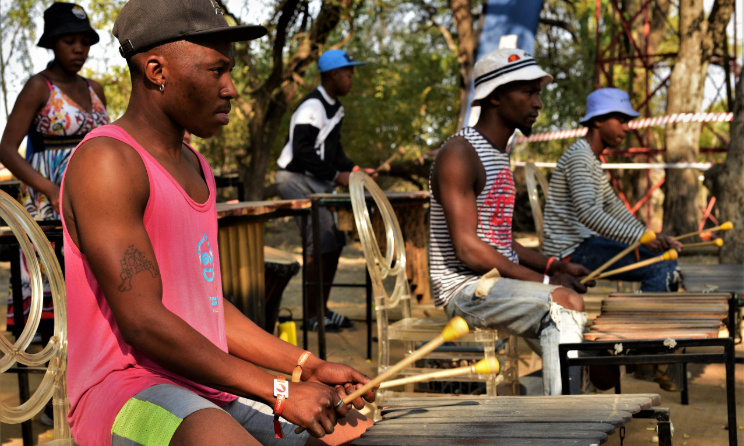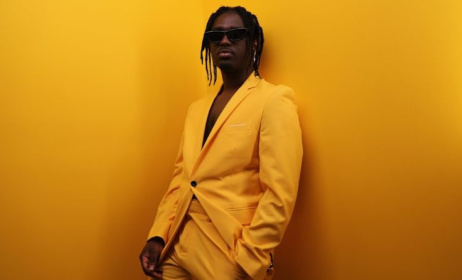From dust till dawn: How to road-trip to Okavango Delta Music Fest
There was a large cast involved in trying to coordinate getting three acts to the Okavango Delta Music Festival. Aside from the performers – the Achikids marimba band, the BDI circus troupe and the Dub Loons pirate band – there was a bunch of mates going with, the festival organisers I had to liaise with, staff at banks and bus companies, and various Home Affairs officials. Thankfully, I didn’t have to work with the officials, but the rest of the bunch all did their best to drive me insane – or perhaps I’m just not cut out for this kind of thing. I should be, having just shaved off a frosty white beard: after 30 years of being a musician, perhaps it’s time to pass on the baton.
 A festivalgoer enjoying the music at the 2019 edition of Okavango Delta Music Festival. Photo: Jonathon Rees
A festivalgoer enjoying the music at the 2019 edition of Okavango Delta Music Festival. Photo: Jonathon Rees BDI circus performer Brendan 'Goat' Green. Photo: Jonathon Rees
BDI circus performer Brendan 'Goat' Green. Photo: Jonathon Rees Achikids performing at the festival. Photo: Jonathon Rees
Achikids performing at the festival. Photo: Jonathon Rees BDI members juggle in front of the Achikids marimba band. Photo: Jonathon Rees
BDI members juggle in front of the Achikids marimba band. Photo: Jonathon Rees The festival welcomes children of all ages. Photo: Henry Smith
The festival welcomes children of all ages. Photo: Henry Smith
My photographer friend Jonathon and I had this brilliant idea: to take the Achikids marimba band from the Orange Farm township into another country, so they could get some experience of other places and performers. We asked festival organiser Sophie Dandridge if our idea was feasible, and she told us: “Get the musicians up here, and I’ll feed and accommodate them.” So I asked if we could also bring up the BDI circus and the Dub Loons pirate band, and she was dead keen.
With just four months before the festival, deadlines were tight. Transforming our idea into reality was taxing: crossing a border with minors requires ticking a thousand boxes. The official idea is that it prevents child trafficking, and I get that, but if one African state is going to be that efficient in enforcing legislation, the other’s Home Affairs must be able to produce the paperwork needed on time – or you have to plan things much further (more like a year) in advance. It wasn’t easy. All the people involved had their own agendas and lives, and work and things took forever to get done, and meanwhile, I was eating my fingernails down to the quick. I’ve always just been a drummer, not an organiser.
Hats off to marimba teacher Mike Makoni, who tirelessly escorted various members of the Achikids from Orange Farm to the Home Affairs offices in Vryheid and Vereeniging and God knows where else to get papers for the younger Achikids.
I’ve been playing music with Mike since I met him in 2000, and he was teaching kids marimbas long before that. I love working with Mike. He loves teaching music to kids. Beautiful people walk among us. The Dub Loons crew – Bronwyn, Brendan and I – had some incredible band practices, very disciplined, that went on for hours, with copious note-taking and recordings made on cellphones and agreements made about beats, choruses and endings. But I knew that, deep in my heart, almost anything can and does happen when we’re up onstage, when the crowd’s rolling about inebriated and you can’t hear yourself in the monitor. That’s why we had to practise so hard.
BDI, the seasoned circus crew, packed a huge stash of circus props, stilts, goat legs, costumes, masks, juggling clubs and balls into their trailer, which I dragged along behind my car. I was assured that it had papers and was roadworthy, unlike the various other vehicles disintegrating in troupe leader JohnJ’s vast and dusty garden. This trailer is held together with string and wire (some of it tied by quite famous people) and before the festival, the part that connects the trailer’s electrics to the car’s electrics fell off and got dragged for miles, becoming a thin, scraped, sorry fraction of its former working self. Of course, it would be fixed before we go, I was assured. Yet as the festival crept closer, at band practices I noted it was still fried and useless. My comments that it should be restored to working order were hailed as ‘panic’. I felt entitled to panic, knowing that I would be dragging a trailer without lights into foreign lands. I had nightmares about the trailer not working and being arrested by cops whose language I couldn’t understand.
Then there was the matter of transferring funds to bus companies, to get the marimba band to Maun. All went well with the South African bus company. But, three banks and five trips to Campus Square Mall later, I had failed to transfer anything but exasperation to the bus company in Gaborone. It was a comical mix of incompetency on my own part, the bank staff and the Botswana bus company I dealt with. We all tried our hardest, and we were really nice to each other, but in the end the marimba band had to take a bankcard with them, to draw cash to pay the bus people – and of course, the card failed to work.
It was all a learning curve for me. There were times that I melted. I learned how stupidly angry I can become when things don’t conform to my wishes. I frightened my wife and pets. I ranted and roared. I’m working on my anger: seriously, I do breathing exercises and walk and run and do yoga and drum, and even take cold showers. Seriously.
Anyway, it all worked out. We held a fundraiser at the Goethe Institute and we got festival tickets from Sophie to sell. Our friends came to the fundraiser, donated or bought tickets and, together with the Goethe and Jonathon’s company Proof Africa, we raised enough cash for three acts to get to the festival. Yes, they walk among us!
The trip
Our departure was amazing: everyone was on time. BDI have been doing festivals for decades, and their trailer had actually been fixed and packed. The fault lay with me: I’d bought new shocks but on my mechanic’s advice I hadn’t bought new springs, so when we linked up the trailer and piled everyone into my old Subaru, the rear end of the car almost touched the back tyres. The front of the car pointed skywards, reminding me of Jiggs Thorne’s poem Free State Ferrari, in which he talks of a souped-up car that “don’t look like this, it looks like THAT”.
There was no Plan B, so we just had to set off, only to find that the slightest bump caused a huge bang from the back of the car. We pushed on with our hearts in our mouths, hoping the shocks didn’t collapse completely. We were well equipped in all other respects: after reading various travel websites, we had ZA stickers, a blue and yellow triangle sticker, a baby seat and affidavits for Bronwyn’s baby, warning triangles … and even a fire extinguisher. Yet, though our ‘pink blob’ of a trailer filled with circus gear was piled massively high and secured with brightly coloured stretch fabric, not one policeman found this unusual or asked us for any of our supposedly vital safety items (undoubtedly, had we not had them, they would have).
We left at an ungodly hour for the Groblersbrug border post. Maun is only 1 250km from Johannesburg, but it’s unwise to drive in the dark in Botswana, and it’s slow going, as the roads are full of cows, donkeys, goats and sheep. There’s also villages and, in a couple of places, serious potholes. Altogether, our trip took more than 15 hours.
Botswana is hot, flat and, aside from millions of scrubby thorn bushes, practically featureless. To keep ourselves from going nuts while crossing it we tried playing I Spy but there was very little to keep the game participants guessing. Tour operators en route through the middle of the country must find other methods than sightseeing to keep their clients entertained. Luckily, we found odd business adverts in the occasional towns to keep us amused, such as Brick Chicks, the Low, Low Butchery and, best of all, F#k Kom Ons Braai.
The next obstacle soon made itself apparent: I had neglected to print out a map, and none of our phones worked because we had crossed that mythical and expensive thing called 'a border'. At our first town we dutifully bought a local SIM card, but this, oddly enough, didn’t function either, so we had to rely on directions I had written in my diary from my wife’s brother, who lives in Maun. As my handwriting is worse than most doctors’, this was far from simple, and to make matters worse, there were no signs anywhere.
You may think I’m joking, but when we finally reached Maun, we discovered why: the council has elected to charge people to erect signs, so most businesses (and towns) in Botswana simply do without them. Due to this oddity we ended up meeting a lot of Batswana, who were very friendly and could speak passable English, and so, with a few minor detours, we eventually found our way to Maun.
We arrived exhausted, just as the sun set, with the baby crying for the first time, and found ourselves, believe it or not, in a traffic jam. The country’s tourist capital has grown considerably since I last visited 10 years ago, and now has over 50 000 residents, one of Africa’s busiest airports and – twice a day – it’s very own rush hour. By now we were used to the lack of signs; it only took five or six stops to establish where the Old Bridge Backpackers was. After drinks and food we collapsed in grateful comfort. No wonder most tourists fly into town!
Next morning was a reprieve: breakfast overlooking a pool with hippos and crocs while the late great Oliver Mtukudzi played over the bar speakers, interrupted by fish eagle cries. I spent the day getting my Subaru springs replaced with Prado ones, the only springs in Maun that vaguely fitted my car: an upgrade that the wonderful mechanic who helped us said he had never performed in his 30 years of fixing cars. Instead of leaning backwards, my car now hunches forward like a really mean off-roader.
I then met up with Jonathon, who had flown in to Maun, and helped him to pay cash to the bus company that had brought the Achikids up to Maun, after the bankcard I gave them failed. In exchange we got the kids’ passports back. We had a great gig that night with local musicians Maf Sheldon and Stigga Sola, and our gig was transformed when our host Helene Forward joined us on violin.
It was a déjà vu evening in many respects. Almost exactly a decade ago I stayed and played at the same venue with Helene (I learnt later that she and her husband David are about to leave the Bridge, so this was their last big gig there). Bronwyn and JohnJ had a blonde baby girl with them last time, too. And our guitarist and singer Brendan Green’s cousin Patrick had driven us up a decade ago to play at the Maun Festival – organised by another Green cousin called Desmond.
The festival
The hippos in the pool below The Bridge, in the bed of the Thamalakane River that flows through Maun’s centre, were in the process of being moved: there’s no food left for them. Botswana, ever arid, is experiencing a devastating drought.
When we finally got to the festival, I met people from Zambia, Zimbabwe, Namibia, Botswana and South Africa – Maun seems to be a central point for folk from these countries – and they were all, without exception, talking about how climate change is affecting them. Southern Africa is apparently the worst hit region in the world.
Last year, the festival was held on a remote island in the bush, surrounded by water – upon which, said previous festivalgoers, floated beautiful water lilies. This year there were just dry, dusty pans. In high-flood years, the waters of the Okavango Delta reach this area and Maun, in a miraculous process of inland river flows.
There was the advantage that this year’s revellers could walk out onto the pans to see the bush or practise fire dancing. The disadvantage was that the air – and soon your clothes, hair and personal items – was thick with dust. It was so dense that at night the beam of your torch looked like it was shining through a snowstorm. “I don’t think people go to a festival for a clean experience – people expect to get basic and dirty and dusty,” Sophie said. “It is dusty with no water, but so is AfrikaBurn.”
Did the lack of water affect attendance? Apparently not. Sophie said: “We have shown that the festival works when there is water and floods there, and also when there is no water there. Numbers were double this year when there was no water, compared to last year when there was water.”
It’s certainly a remote venue, one where everything – including water – has to be ferried in by vehicles capable of handling deeply rutted, sandy tracks. My logistical problems paled in comparison to what Sophie had to deal with. So there were glitches, like the main generator failing repeatedly on the Friday night, and the eco-friendly plan of everyone bringing their own cutlery and crockery getting shelved in favour of paper plates and plastic beer mugs.
“Festivals will always have teething problems in a new area as remote as this in only their second year," Sophie said. "It's impossible to run an event of that size smoothly, in such a remote location, with unskilled community labour, no facilities, no awareness of that type of event, no tarred roads, and with no budget – the festival was funded from the personal pockets of the organisers, as ticket sales managed to cover only 40% of the actual costs.
“You think you’ve planned it to the nth degree and then halfway through all the plans fall apart, the shuttles break down, people pack up and leave when they are supposed to be fulfilling vital roles and there is nothing you can do about it. You make a plan and troubleshoot as you go, but you cannot control the uncontrollable.”
We met the flamboyant Sophie (at this point she was wearing a Native American feather headdress) as we arrived and she directed us to our sleeping quarters, which were pleasantly surprising. Our canvas tents were beneath the thorn trees scattered around the edge of the island, each with our names attached to them. The staff at our campsite, which was called Delta Rain, guarded our belongings 24/7 and kept us supplied with water and firewood. There was also a shower, a boma tent, chairs and a table. Styling!
The Achikids had more basic sleeping arrangements, perhaps because they are less established musicians. Our contingent of friends who had come up on their 4x4s set up camp near us, and this meant that we could escape the hubbub of the festival and chat around fires, under clear African skies and the Milky Way. This, along with the stunning sunsets, was the highlight of the festival for me.
Our campsite was filled with Zimbabwean musicians from the bands The McKay.z, Evicted, So Kindly, Djembe Monks and Flying Bantu. These bands stole the show, though I also loved the performances of South Africa’s Bongeziwe Mabandla and, on the last night, local band Goddy & 100% Africa, joined by rows of enthusiastic dancers who looked like they came walking across the pans from distant villages as the sun set on the final day of the festival. There were a few decent DJs, but really, who wants to watch a DJ at a festival?
I played drums with the marimba band during their 9am slot each morning, juggled and helped to carry gigantic worms and birds through the crowd with the BDI circus, and sang lusty Irish ditties with the Dub Loons. I’m not sure if the Maun crowd got our pirate band thing, but then again, we were a long way from the sea. The Achikids appeared to enjoy the experience, and some said they met people from as far afield as Mozambique.
Watching the little gangs of children and dogs come and go among the adult revellers, I suddenly got what this festival is about: space. There’s enough room on the island for people to move around and dance freely, it’s all outdoors, and it’s all safe, so parents don’t have to worry if their kids have disappeared for half an hour. If you have a 4x4 and you want to party in nature without thousands of people and the commercial headache that bigger festivals have become, the Okavango Delta Music Festival is the destination for you.
Sophie says the idea behind the festival is to provide alternatives to wildlife tourism in the delta such as music tourism, so that people can come and enjoy the area and experience something new in Maun; make Maun and its surrounds areas a ‘destination' rather than just having tourists who fly straight into expensive five-star camps in the delta, and not experience local communities and the real Botswana; and provide training and an income for an impoverished community that otherwise has no alternatives to cattle, which are not doing well in the drought and overgrazing the area.
She said 220 locals were trained on site and employed by the festival; they got food, experience, T-shirts and wages. The festival also donated two wells and several hand pumps so the local community has more access to water, and last year’s festival worked on a borehole for them with the Okavango Kopano Mokoro Community Trust.
There was certainly a lot of support from local businesses. There were sponsored flights to and from Zimbabwe; the card machines, WiFi, public liability insurance and tents were also provided by sponsors. Some of the bigger acts got choppered in, and some even had safaris in the delta laid on for them.
Will there be a third festival? “It is too soon to decide if we will hold another festival next year,” Sophie said, “as we need to weigh up the financial losses for the second year against the benefits to the wider Maun community and to the country’s tourism, as well as the benefits to the local community. It is something we will be discussing with the Botswana government in due course, and we will make a decision with them when the time is right.”
After the festival
Everyone got home safely! The Achikids will be playing at the Goethe-Institut’s Open Day on Saturday 28 September, from 12 noon. Big thanks to Sophie and the festival staff, all the performers involved and everybody who donated and got the acts to Maun.

































Comments
Log in or register to post comments